Top 10 Best Medical Scheduling Software for Hospitals in 2025
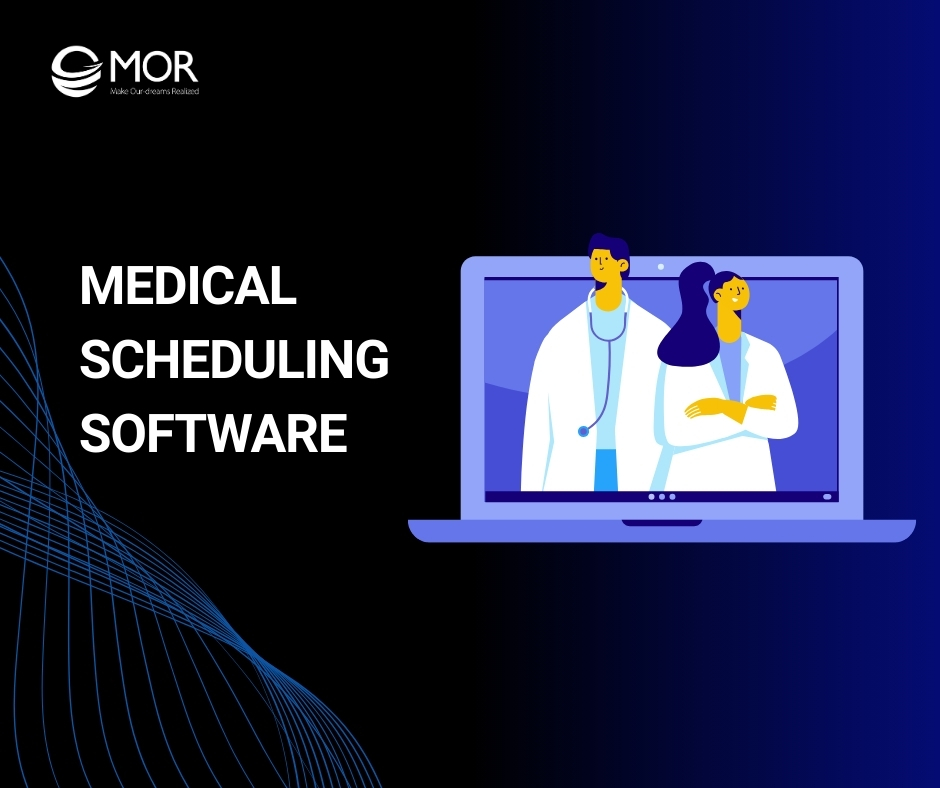
Managing hospital appointments is never easy, which is why medical scheduling software is now essential. The right medical appointment scheduling software helps prevent double bookings, improve patient satisfaction, and ease staff workload. In this guide, MOR Software will share the top solutions for 2025 and what to consider when selecting the best one for your hospital.
What Is Medical Scheduling Software?
Medical scheduling software is built to simplify how hospitals and clinics organize appointments, staff calendars, and patient interactions. Unlike general tools used for basic time management, this type of solution is tailored to the unique workflows of healthcare providers. It supports teams by handling online bookings, sending reminders, and even connecting patients through secure portals or messaging systems.
The strength of using medical appointment scheduling software lies in its automation. With a single view, administrators can check upcoming visits, track provider availability, and reduce manual errors. Dashboards can also be customized to match each clinic’s processes, helping staff focus less on paperwork and more on patient care.
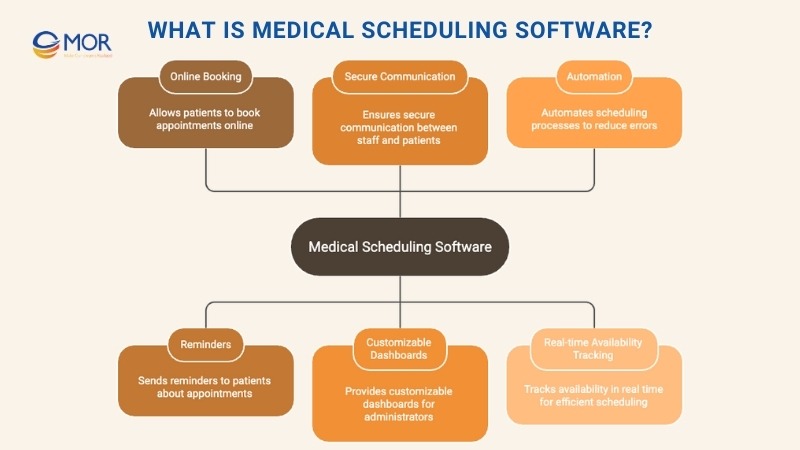
What Is Medical Scheduling Software?
Key Benefits Of Medical Scheduling Software
Using medical scheduling software built with HIPAA safeguards brings clear advantages for both providers and patients. Here are the most important ones:
- Protect sensitive information: A top benefit of any HIPAA-ready platform is the protection it gives to patient records. Encryption, access controls, and audit logs help clinics meet security standards while keeping private data safe. For context, data security stakes are high in healthcare, with the average cost of a breach reported at 9.77 million USD in 2024. This shows why strong safeguards matter so much.
- Strengthen patient confidence: Patients feel reassured when their hospital or clinic uses a trusted hospital scheduling system that complies with privacy laws. It signals that their information is handled with care and that every step follows strict regulatory standards.
- Automate daily tasks: Automation reduces manual work, saving staff from time-consuming paperwork. A HIPAA-compliant platform helps teams run processes faster and more accurately, improving the overall flow of care delivery. Simple digital nudges also make a difference, with randomized and review evidence showing text reminders increase attendance by about 10% compared with no reminders.
- Prevent costly penalties: Falling short of compliance can lead to fines and reputational loss. Relying on a secure scheduling system helps providers stay on the right side of federal requirements and avoid unnecessary risks. The HHS Office for Civil Rights has announced 152 cases with settlements or civil money penalties totaling about 144.9 million USD as of November 21, 2024
- Reduce booking errors: Another benefit is fewer problems with double bookings or missed appointments. The appointment scheduling software for healthcare tracks availability in real time, giving staff confidence that calendars stay accurate and patients receive timely care. Missed visits remain a measurable issue, with outpatient no-show rates often reported between about 23 and 34% in published studies.
When combining compliance, security, and automation, medical offices gain a reliable foundation for safe and efficient scheduling.
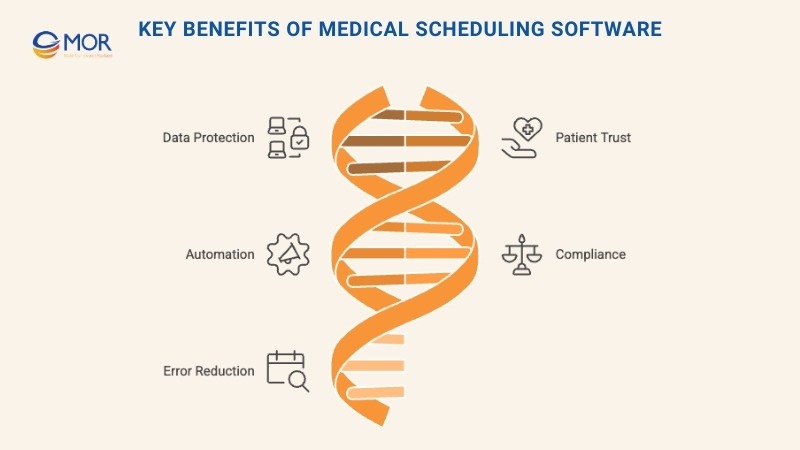
Key Benefits Of Medical Scheduling Software
Top 10 Medical Scheduling Software Solutions In 2025
The market offers many scheduling tools, yet only a few are truly suited for hospitals that need secure and compliant operations. Choosing the right medical scheduling software means looking for features like strong encryption, user authentication, and administrative controls that align with HIPAA rules.
With that in mind, we’ve outlined ten trusted providers based on security, usability, and value. Each helps medical teams deliver better care while maintaining compliance.
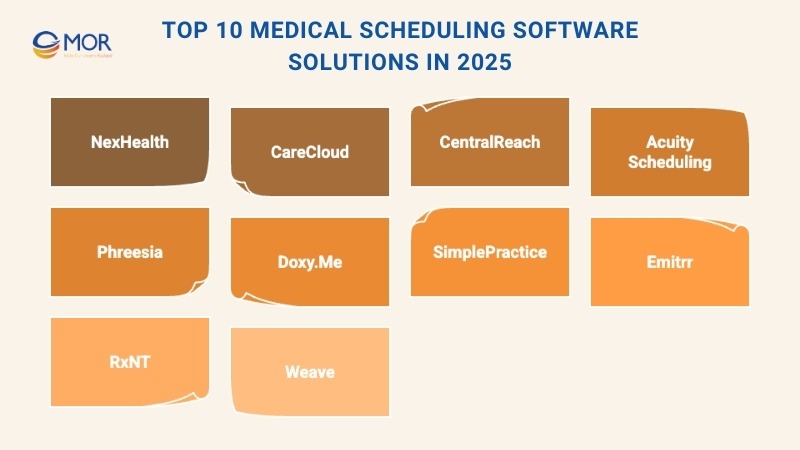
Top 10 Medical Scheduling Software Solutions In 2025
1. NexHealth
NexHealth is a patient engagement and scheduling platform designed for healthcare organizations. It provides a Business Associate Agreement during signup, ensuring clinics take proper steps to protect PHI. The tool improves workflows with easy scheduling, digital intake forms, and automated reminders, all while meeting compliance requirements.
Key highlights:
- Secure communication that follows HIPAA protocols
- Consolidated patient information across connected systems
- Tools for monitoring satisfaction and engagement
- Digital forms for fast check-ins and consistent data
- Integration with EHR systems to simplify record management
2. CareCloud
CareCloud is a cloud-based medical scheduling software that supports advanced appointment handling and practice management. As part of its terms, it includes a BAA and multiple safeguards to protect private health records. The platform also helps providers manage financial and clinical workflows within a single ecosystem.
Key highlights:
- Flexible documentation with attachment support
- Built-in tools for claim statements and balance tracking
- Features for resolving denied claims quickly
- Centralized platform for coordinating practices
- Charting templates that save time for clinicians
3. CentralReach
CentralReach is designed with the needs of ABA therapy providers in mind. This online platform complies with HIPAA standards and includes a Business Associate Agreement in its service terms. Its suite of tools covers patient intake, scheduling, billing, and secure documentation, making it a trusted choice for specialized practices.
Key highlights:
- Manage intake, appointment scheduling, billing, and claims from one system
- Use mobile data entry for accurate and secure record management
- Built-in reporting and analytics deliver actionable insights
- Support assessments for autism and IDD, with LMS integration for training
- Improve case management speed and reduce administrative workload
4. Acuity Scheduling
Acuity Scheduling is a popular medical scheduling software among healthcare providers seeking a simple yet secure solution. The platform helps practitioners manage appointments while protecting PHI, offering features that align with HIPAA requirements for storage and processing. It’s well-suited for clinics that want to balance ease of use with compliance.
Key highlights:
- Patients can book their own appointments online
- Set rules for daily or periodic appointment limits
- Share clear cancellation policies with patients
- Generate invoices and receipts in one dashboard
- Accept pre-payments to reduce no-shows and cancellations
Note: A Powerhouse plan is required to unlock HIPAA-compliant features in Acuity Scheduling.
5. Phreesia
Phreesia is one of the scheduling programs for medical offices that supports both scheduling and practice management. It enables healthcare providers to improve the patient journey by simplifying registration, enhancing appointment coordination, and streamlining claims handling. The system also empowers clinics to maintain steady communication and deliver a smoother experience across all touchpoints.
Key highlights:
- Improve pre-visit workflows with online registration and self-booking
- Gather medical and family history using an intuitive intake module
- Cut down on no-shows with reminders sent by text, voice, or email
- Personalize patient outreach to address care gaps more effectively
- Capture demographic data for reporting and analytics to guide decisions
6. Doxy.Me
Doxy.Me is a telehealth solution designed for HIPAA compliance that makes virtual visits easy to manage. This medical scheduling software consolidates patient records, strengthens communication, and simplifies post-visit documentation in a single platform. A free BAA is included with each subscription, giving providers confidence in meeting compliance standards.
Key highlights:
- Integrate seamlessly with EHR systems to unify records
- Create post-visit notes and charts with simple tools
- Adapt settings to match the specific needs of each practice
- Offer customized waiting rooms and transfer patients between them
- Handle video-based appointments securely and without extra setup
7. SimplePractice
SimplePractice is an all-in-one EHR and practice management platform that supports appointment booking, care plan management, claims, communication, and payments. It also enables providers to maintain accurate patient records in one place while ensuring every process aligns with HIPAA standards. Designed to adapt to different types of practices, it delivers reliable workflows and compliance in a single solution.
Key highlights:
- Advanced safeguards with tiered access controls and data encryption
- Custom workflows that adjust to specific operational requirements
- Patient self-service portal with access to notes and e-prescriptions
- Secure handling of PHI, treatment notes, and health assessments
- Tools that automate tasks for nutritionists, dieticians, and other specialties
8. Emitrr
Emitrr provides modern medical scheduling softwares for healthcare practices aiming to simplify operations and improve patient experience. The platform focuses on usability for both staff and patients, combining scheduling with communication features and integration with existing systems. This makes it a valuable option for clinics that want to reduce inefficiencies while strengthening engagement.
Key highlights:
- Easy-to-use dashboard for quick booking and management
- Automated reminders via text and email to cut down on no-shows
- Digital intake forms that reduce paperwork and speed up check-ins
- Calendar sync with EHR systems for real-time updates
- Automatic review requests to build feedback and online reputation
- Integrations with Dentrix, Curve Hero, and DrChrono for smoother workflows
9. RxNT
RxNT is designed to help practices handle complex scheduling needs across multiple locations. This medical office scheduling software reduces staff overload by balancing appointments, allowing providers to improve resource allocation and patient care. It also connects easily with billing tools, giving clinics a more unified workflow.
Key highlights:
- Integration with existing practice tools and multi-location scheduling support
- Automated reminders to reduce missed visits and last-minute cancellations
- Mobile apps for iOS and Android, making schedules accessible on the go
- Seamless connection with RxNT’s billing platform for smoother operations
10. Weave
Weave focuses on simplifying communication and scheduling to create a better patient experience. As a patient scheduler software, it helps reduce the number of phone calls, allowing patients to manage their own bookings online. This not only eases the administrative burden but also minimizes no-shows.
Key highlights:
- Online appointment requests so patients can choose their preferred time slots
- Customizable text templates for quick confirmations or rescheduling
- Calendar syncing with PMS or EHR systems for real-time updates
- Google integration, letting patients book directly from search results
Features To Look For When Choosing A Medical Scheduling Software
Finding the right medical scheduling software means focusing on the features that truly support efficiency, compliance, and flexibility in daily operations. Below are two of the most important capabilities to look for.

Features To Look For When Choosing A Medical Scheduling Software
Centralized Support For Multiple Providers And Clinic Locations
Large hospitals and busy clinics often need to coordinate schedules across departments or satellite offices. A strong scheduling software for medical offices should allow administrators to manage multiple providers and multiple sites from one dashboard. Centralized oversight not only improves visibility but also lowers the chance of double bookings, ensuring appointments run smoothly no matter where they take place.
Automated Scheduling And Provider Shift Management
Automation is key for practices dealing with complex calendars and rotating staff. Tools that generate schedules automatically based on rules like provider availability, specialty, or on-call shifts save hours of manual work. Automated scheduling minimizes errors, keeps workloads balanced, and guarantees proper coverage. For hospitals, this means doctors, nurses, and support teams are always scheduled effectively without the stress of constant adjustments.
Mobile-Friendly Access With Real-Time Notifications
Modern medical scheduling software should support mobile access so providers can manage appointments anywhere. Mobile apps or secure web portals give doctors and staff the ability to update calendars, confirm visits, and view availability on the go. Real-time alerts and push notifications ensure teams are notified immediately about cancellations, reschedules, or urgent changes. This improves flexibility, allowing clinical staff to respond quickly and keep patient flow consistent in busy environments.
Direct Integration With EMR And EHR Systems
A reliable medical clinic scheduling software needs to integrate directly with electronic health record systems. This connection eliminates duplicate data entry, since scheduling details automatically sync with patient records. During appointments, providers have instant access to relevant information, making care delivery more accurate and efficient. It also supports better billing accuracy, since patient data and scheduling details flow into the same system. Seamless integration between scheduling and EHR tools helps clinics maintain organized workflows and ensure that administrative and clinical processes work in harmony.
HIPAA-Grade Data Security And Compliance Tools
Since medical scheduling software handles sensitive patient records, strong protection is non-negotiable. A trusted system should include secure login credentials, role-based access, and full encryption for all stored and transmitted data. Compliance with HIPAA and related privacy laws safeguards confidentiality while lowering legal risks. Clinics that use secure scheduling platforms also gain patient trust by showing that their information is protected at every step.
Built-In Reporting And Analytics For Operations
Reporting features give administrators the ability to track performance and identify trends. Metrics such as appointment fill rates, staff productivity, cancellations, and no-show patterns help leaders make smarter decisions. A good patient scheduling solution also offers custom reporting, so hospitals can analyze data in ways that fit their own priorities. With these insights, management can better allocate resources and improve overall efficiency.
Easy-To-Use Interface For Staff And Patients
Ease of use matters as much as functionality. A clean, intuitive interface makes it simple for doctors, nurses, and front-desk staff to complete tasks quickly without mistakes. Patients also benefit from clear booking portals that reduce confusion. When a medical staff scheduling software requires less training and minimizes data entry errors, the entire clinic runs more smoothly, boosting staff satisfaction and patient experience alike.
MOR Software – Your Partner for Custom Medical Scheduling Software
At MOR Software, we don’t just review existing medical scheduling software—we design and build custom healthcare scheduling platforms tailored to each hospital, clinic, or healthcare network. Unlike off-the-shelf tools, our solutions are created around your workflows and compliance needs.
What we deliver:
- Seamless EHR/EMR integration: Sync patient data and appointment records directly into your existing systems.
- User-friendly UX/UI: Intuitive design for doctors, nurses, and patients.
- HIPAA and ISO-certified security: Full compliance with strict healthcare data regulations.
- Cross-platform access: Web portals, mobile apps, and admin dashboards.
- Custom analytics and reporting: Actionable insights to optimize resources and staffing.
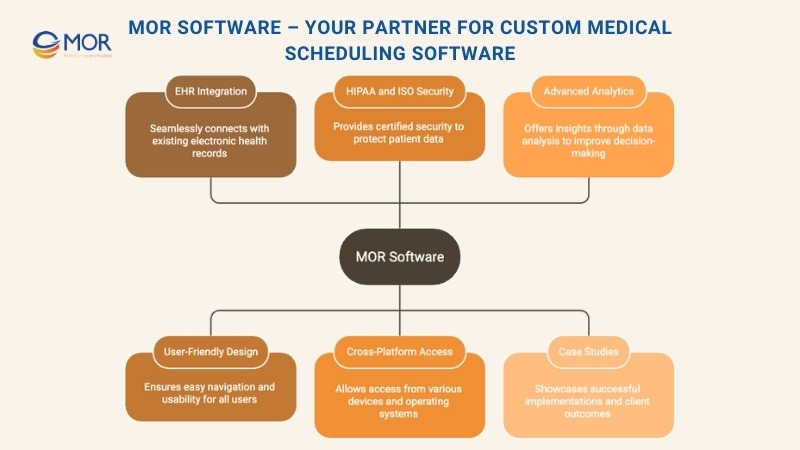
MOR Software – Your Partner for Custom Medical Scheduling Software
Our healthcare case studies highlight this expertise:
- In-depth Healthcare System – A two-year project for hospitals and clinics, integrating medical devices, automating billing, and building role-based dashboards. The system significantly cut down manual work, improved billing accuracy, and scaled easily across multiple facilities.
- Online Healthcare Consultation – A telemedicine platform for a large Japanese clinic, enabling patients to book appointments, join secure video consultations, and receive digital prescriptions. Built with AWS for scalability, it expanded care access and streamlined the prescription process.
- Orthocomm Dental Management System – A patient-dentist management platform featuring treatment tracking, disease image comparisons, and automated appointment reminders. It helped reduce missed visits, improved adherence, and strengthened patient engagement.
With proven experience in healthcare web apps, mobile apps, and Salesforce Health Cloud integrations, MOR Software is a trusted partner for providers aiming to improve patient experience and streamline operations.
Contact MOR Software today to explore a tailored medical scheduling solution for your organization.
FAQs: Medical Scheduling Software
What is the best scheduling software for healthcare?
Some of the most effective scheduling platforms for healthcare include Solutionreach, which enhances patient engagement with communication tools and flexible booking. Other popular options are NextGen, Athenahealth, Kareo, and DrChrono.
What software is most frequently used by medical practices?
Medical practices often rely on several types of software, including Hospital Management Systems (HMS), appointment scheduling tools, Electronic Health Records (EHR), health monitoring apps, medical billing programs, electronic prescriptions (EPCS), imaging software, and medical diagnosis solutions.
What is the best medical management software?
Top-rated practice management systems in 2025 include CERTIFY Health, designed to meet the needs of healthcare organizations of all sizes. Other strong contenders are PracticeSuite, OmniMD, SimplePractice, CureMD, Claimocity, and Medesk.
What software do they use in hospitals?
Hospitals primarily use Electronic Health Record (EHR) software. This system stores patient information digitally, functioning similarly to a CRM but customized for medical settings.
What do most medical practices use a specialized software program for?
Specialized medical software helps manage critical tasks such as patient records, billing, diagnostics, and remote monitoring. Clinics, hospitals, and private practices rely on these tools to streamline operations and provide accurate, timely care.
What type of software may be used to schedule patients?
YouCanBookMe is a popular choice for patient scheduling. It offers a user-friendly interface and flexible booking options that allow patients to book appointments at their convenience.
What is the most used medical software?
Electronic Health Records (EHR) are currently the most widely adopted type of medical software. They replace handwritten charts by securely organizing and storing patient data in digital form.
What is considered medical software?
Medical software refers to any digital system used in healthcare, ranging from diagnostic or therapeutic tools to patient portals. These platforms reduce paperwork and make it easier for providers to deliver digital services directly to patients.
Conclusion
Choosing the right medical scheduling software can transform how hospitals manage time, staff, and patient care. From preventing double bookings to ensuring compliance and improving patient experiences, these tools are now essential for modern healthcare. With expertise in custom platforms, telemedicine apps, and secure system integrations, MOR Software helps providers adopt solutions built around their workflows. Contact MOR Software today to explore a tailored appointment medical scheduling software that improves efficiency and delivers better care outcomes.
MOR SOFTWARE
Frequently Asked Questions (FAQs)
What is the best scheduling software for healthcare?
Some of the most effective scheduling platforms for healthcare include Solutionreach, which enhances patient engagement with communication tools and flexible booking. Other popular options are NextGen, Athenahealth, Kareo, and DrChrono.
What software is most frequently used by medical practices?
Medical practices often rely on several types of software, including Hospital Management Systems (HMS), appointment scheduling tools, Electronic Health Records (EHR), health monitoring apps, medical billing programs, electronic prescriptions (EPCS), imaging software, and medical diagnosis solutions.
What is the best medical management software?
Top-rated practice management systems in 2025 include CERTIFY Health, designed to meet the needs of healthcare organizations of all sizes. Other strong contenders are PracticeSuite, OmniMD, SimplePractice, CureMD, Claimocity, and Medesk.
What software do they use in hospitals?
Hospitals primarily use Electronic Health Record (EHR) software. This system stores patient information digitally, functioning similarly to a CRM but customized for medical settings.
What do most medical practices use a specialized software program for?
Specialized medical software helps manage critical tasks such as patient records, billing, diagnostics, and remote monitoring. Clinics, hospitals, and private practices rely on these tools to streamline operations and provide accurate, timely care.
What type of software may be used to schedule patients?
YouCanBookMe is a popular choice for patient scheduling. It offers a user-friendly interface and flexible booking options that allow patients to book appointments at their convenience.
What is the most used medical software?
Electronic Health Records (EHR) are currently the most widely adopted type of medical software. They replace handwritten charts by securely organizing and storing patient data in digital form.
What is considered medical software?
Medical software refers to any digital system used in healthcare, ranging from diagnostic or therapeutic tools to patient portals. These platforms reduce paperwork and make it easier for providers to deliver digital services directly to patients.
Rate this article
0
over 5.0 based on 0 reviews
Your rating on this news:
Name
*Email
*Write your comment
*Send your comment
1